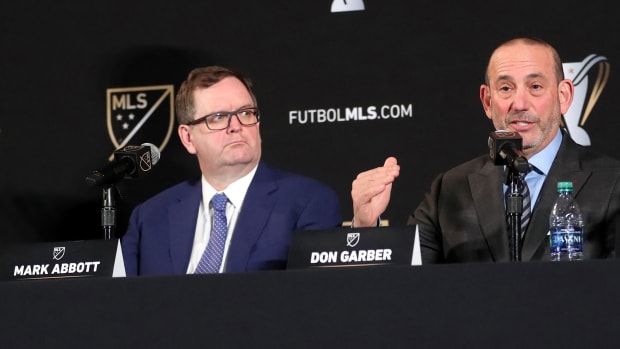The ball is in MLS's court ahead of its own deadline to reach a new agreement with its players.
The MLS Players Association offered some $53 million in new concessions to the league, the union announced on Thursday, in a move designed to avoid a possible lockout that could begin Friday. Almost a month since MLS invoked a CBA clause that forced the sides back to the negotiating table, the ball—to mix sporting metaphors—is now in the league’s court.
MLS could accept the offer, reject it and continue to negotiate as if there were no deadline or reject it and terminate the existing CBA. If it accepts, then preseason training camps will be on track to commence Feb. 22, with the regular season kicking off the weekend of April 3-4.
If MLS rejects the union’s proposal and decides to terminate the CBA, the league and players would continue to operate under the terms of that CBA unless there’s a lockout (possible) or a strike (almost no chance). Either would constitute the first work stoppage in league history. A lockout theoretically would set negotiations back to square one, while denying players their paychecks and barring them from team facilities. Players then would be free to pursue opportunities elsewhere until the lockout is resolved. MLS recently sent a memo to clubs and staff telling them to expect further information on lockout rules and procedures, according to ESPN.
The current crisis began in late December when, faced with another year of potentially heavy, pandemic-induced losses, MLS invoked the force majeure clause from the CBA ratified last June. That opened the minimum 30-day negotiating window that’s set to close Friday. June’s CBA accounted for the losses the league expected in 2020 and included a 5% cut to player salaries and a one-year extension through 2025. The MLSPA valued those concessions at around $150 million.
This month, MLS said it is now seeking an additional $100 million-$110 million to offset losses it expects to incur this year. Its proposal to the union was anchored by its promise to pay players their full salaries in 2021 in exchange for a two-year extension to the CBA through 2027, which would flatten compensation growth and force players to miss out on gains that might result from the build-up to the 2026 World Cup.

On Thursday, the MLSPA agreed to offer the league one of those years, in addition to a reduction in the player salary budget in 2022-25 and a cut in the percentage of media revenue owed to players. Those concessions would be slightly offset by a loosening of certain free agency restrictions. In financial terms, it amounts to about half of what the league is seeking, and it creates symmetry between the two seasons marred by the pandemic and the two years of CBA extension (one agreed to in June and one now). The union also has made the point that MLS clubs can cut millions in costs by reducing discretionary roster spending on Designated Players and Targeted Allocation Money players.
“Players and staff have clearly borne substantial risk to their physical health because of the pandemic. With these concessions, players have also unquestionably borne a substantial portion of the league’s Covid-related financial losses,” the MLSPA said in Thursday’s statement.
“While concessions are always difficult to make, players have seen first hand the severe impact the pandemic has had on MLS,” it continued. “They recognize and appreciate the collective sacrifice that was required from league staff, club staff, match-day employees, ownership groups and fans to complete the 2020 season, and they recognize that this impact will continue to be felt by all as the 2021 season gets under way. Today’s proposal will allow players, fans and the entire MLS community to get back to the crucial business of building this league for the years and decades ahead. A work stoppage at this time and in this environment would be catastrophic for the standing of MLS, both domestically and internationally. It is our sincere hope that it can be avoided. Players are ready to play.”